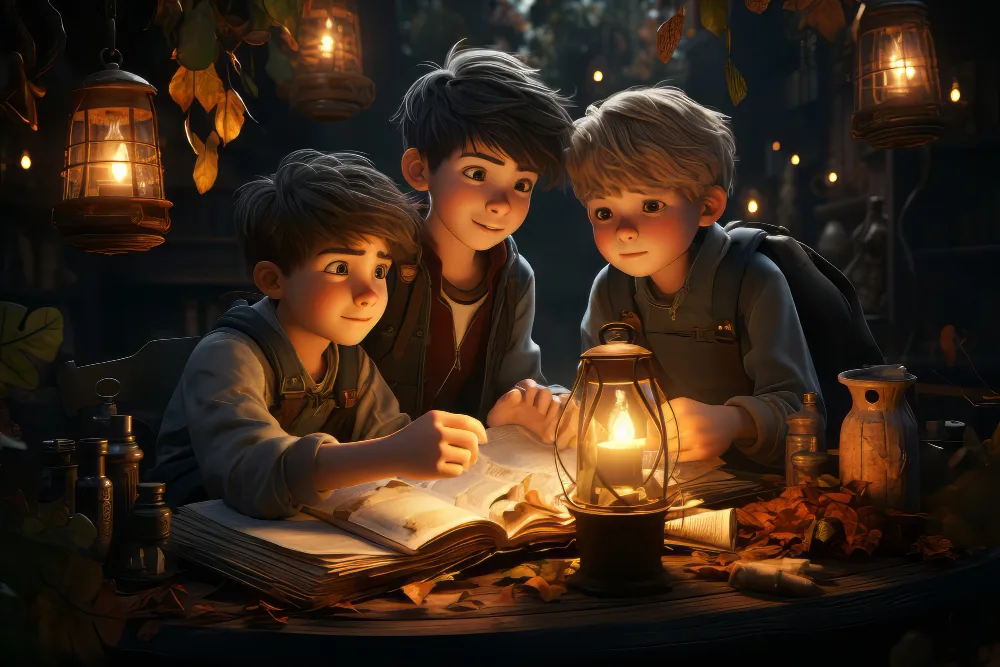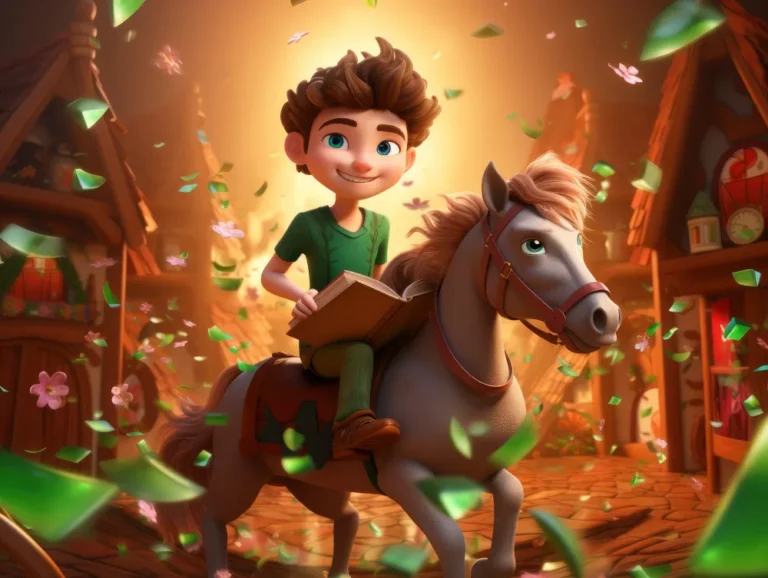Short Moral Stories for Kids in English
Introduction to Short Moral Stories for Kids
Is your child interested in inspirational moral stories that ignite their imagination and teach them valuable lessons? Short moral stories for kids have been a cornerstone of childhood for generations, captivating young minds while imparting wisdom in simple yet meaningful ways. As parents, we often wonder how to engage our children in activities that are both entertaining and educational. Here’s where short moral stories come into play.
These moral stories for kids to learn values are not just tales; they are an experience. When you read or narrate a story to your child, it creates a magical moment of bonding. You’re not just telling a story—you’re introducing them to a world of creativity, problem-solving, and moral values. Imagine your child learning the value of honesty from The Boy Who Cried Wolf or understanding kindness through The Lion and the Mouse. Isn’t it wonderful when life lessons are conveyed through a fun and engaging medium?
We all know how curious kids are, always asking questions and seeking answers. Short moral stories satisfy their curiosity while shaping their understanding of right and wrong. Plus, they’re an excellent way to make bedtime or leisure time more meaningful.
Do you ever wonder how these moral stories for kids before bedtime can positively influence your child’s character? Whether it’s about teaching perseverance, empathy, or gratitude, these tales leave a lasting impression. They’re also a great way to encourage a love for reading, a skill that benefits kids throughout their lives.
So, why not dive into the wonderful world of short moral stories with your child? Together, you’ll laugh, learn, and grow, turning everyday moments into unforgettable memories. Educational moral stories for children are more than entertainment—they’re a gift that keeps giving, nurturing your child’s mind and heart.
20 Life-Changing Short Moral Stories for Children
The Honest Woodcutter
Once upon a time, there was a poor woodcutter who worked in the forest. One day, his axe slipped from his hand and fell into the river. Distraught, the woodcutter sat by the water, lamenting his loss. A fairy appeared and offered him a golden axe, but the woodcutter refused, saying it was not his. She then offered him a silver axe, which he also refused. Finally, she gave him his own axe, and she rewarded him with the golden and silver axes for his honesty.
Moral: Honesty is always rewarded, and integrity is more valuable than material possessions.
The Tortoise and the Hare
Once upon a time, a boastful hare challenged the slow-moving tortoise to a race. Confident of winning, the hare raced ahead and decided to nap midway, thinking the tortoise could never catch up. The tortoise, however, kept moving at a steady pace and passed the sleeping hare. When the hare awoke, he saw the tortoise nearing the finish line and rushed, but it was too late. The tortoise had won the race.
Moral: Slow and steady wins the race. Consistency and persistence lead to success.
The Greedy Dog
A hungry dog found a delicious bone by the river. As he walked across a bridge, he saw his reflection in the water and thought it was another dog holding a bigger bone. Greedy, he tried to snatch the bone from the reflection, but in doing so, he dropped his own bone into the river.
Moral: Greed can lead to losing what you already have. Be content with what you have.
The Lion and the Mouse
One day, a mighty lion was resting when a little mouse scurried across his paw. The lion caught the mouse but decided to let it go. The mouse, grateful, promised to return the favor one day. Later, the lion was trapped in a net by hunters. Hearing his roars, the mouse came and gnawed through the ropes, freeing the lion.
Moral: Even the smallest creatures can be of help when needed. Kindness is always returned.
The Ant and the Grasshopper
During the summer, the hardworking ant gathered food for the winter, while the grasshopper played and sang. When winter arrived, the grasshopper had no food, while the ant was warm and well-fed. The grasshopper begged the ant for help, but the ant reminded him that he should have worked hard in summer.
Moral: Hard work and preparation are essential for the future. Don’t procrastinate.
The Boy Who Cried Wolf
A young shepherd boy, feeling bored, cried out, “Wolf! Wolf!” even though there was no wolf. The villagers rushed to help but found no danger. The boy laughed and promised never to do it again. But when a real wolf appeared, and the boy cried out for help, the villagers thought it was another false alarm. The wolf attacked the sheep.
Moral: Lying destroys trust. Once lost, trust is hard to regain.
The Fox and the Grapes
One day, a hungry fox saw a bunch of juicy grapes hanging from a vine. He jumped and jumped to reach them but couldn’t. Frustrated, he walked away, muttering, “Those grapes are probably sour anyway.”
Moral: It’s easy to belittle what we cannot have. Avoid self-deception.
The Golden Goose
A farmer had a goose that laid golden eggs every day. Greedy for more wealth, the farmer killed the goose, hoping to find all the eggs inside. But when he cut her open, there were no eggs. The farmer lost both the goose and the golden eggs.
Moral: Patience is important. Greed can lead to losing everything.
The Lion’s Share
Once upon a time, a lion, a tiger, a wolf, and a fox caught a deer. When it was time to divide the meat, the lion took the largest portion and claimed that as the king of the forest, he deserved the lion’s share. The others reluctantly agreed.
Moral: Fairness in sharing is important. Do not take more than your fair share.
The Dog and His Reflection
A dog found a bone and trotted across a bridge, holding it in his mouth. When he saw his reflection in the water, he thought another dog had a larger bone. Eager to get it, he opened his mouth to grab the bone from the reflection, only to drop his own into the river.
Moral: Greed can cause you to lose what you already have.
The Farmer and the Stork
A farmer set a trap to catch cranes that were eating his crops. One day, he trapped a stork by mistake. The stork pleaded for his life, claiming he was not a crane. The farmer replied, “You were with the wrong company.”
Moral: You are judged by the company you keep. Be careful of your associations.
The Crow and the Pitcher
One hot day, a thirsty crow found a pitcher with water at the bottom. He could not reach the water, but he had an idea. He dropped pebbles into the pitcher, causing the water to rise until he could drink.
Moral: Creativity and thinking outside the box can solve problems.
The Fox and the Crow
A hungry crow found a piece of cheese and sat on a tree to eat it. The sly fox, seeing the crow, flattered her, praising her beauty and voice. The crow, pleased, opened her mouth to sing, dropping the cheese, which the fox quickly snatched.
Moral: Be wary of flattery, as it can be used to deceive.
The Greedy Jackal
A jackal found a large meal but couldn’t decide whether to eat the raw food or the cooked food. While he hesitated, a crow swooped in and ate both meals.
Moral: Don’t procrastinate. Make decisions promptly or risk losing opportunities.
The Wise Owl
A rabbit asked the wise owl sitting on a branch, “Why do you stay so still and silent?” The owl replied, “By being still, I observe the world around me and learn more. Listening is as valuable as speaking.”
Moral: Listening is as important as talking. Pay attention to learn.
The Frog and the Ox
A frog saw an ox and thought, “I can be as big as that ox!” He puffed himself up, but no matter how hard he tried, he couldn’t grow as large. Finally, he burst.
Moral: Be happy with who you are and don’t try to be something you are not.
The Farmer’s Donkey
A farmer’s donkey fell into a well, and the farmer thought it would be too costly to save it. So, he decided to bury it. But the donkey kept shaking off the dirt and stepping on it, eventually climbing out of the well.
Moral: Resilience in the face of adversity leads to success. Keep moving forward.
The Goose and the Golden Eggs
A farmer had a goose that laid golden eggs daily. Eager for more wealth, the farmer killed the goose, hoping to find a large stash of golden eggs inside. But he found nothing.
Moral: Patience is essential; greed can cause you to lose everything you already have.
The Lion and the Traveler
A traveler got lost in the forest and stumbled upon a lion. As the lion approached, the traveler prayed for mercy. To his surprise, the lion walked away, showing mercy.
Moral: In difficult situations, calmness and humility can lead to unexpected outcomes.
The Hare and the Tortoise Again
The hare, eager to win once more, challenged the tortoise to another race. This time, he did not nap but grew tired. The tortoise, however, kept moving at a steady pace and won again.
Moral: Persistence is key. Never give up, even when others doubt you.
Benefits of Short Moral Stories for Kids
Short moral stories with values offer numerous benefits for children, making them a timeless educational tool that seamlessly combines entertainment with learning. These moral stories for kids in English play a crucial role in the overall development of young minds by embedding essential values, skills, and habits through engaging narratives. For starters, short moral stories are an effective medium for teaching core values. Children absorb lessons of honesty, kindness, perseverance, and courage by observing the actions of relatable characters like animals, children, or even fantastical beings. For example, a story like The Tortoise and the Hare instills the value of persistence in an enjoyable and memorable way, ensuring the lesson sticks.
Moreover, these best moral stories for children enhance cognitive development. By following a plot, recognizing problems, and anticipating resolutions, children strengthen their critical thinking and analytical skills. When they encounter similar situations in real life, they can apply the lessons learned, fostering problem-solving abilities. For instance, a story about teamwork might inspire them to work cooperatively during group activities.
Another significant benefit is the improvement of language skills. Through exposure to rich vocabulary, sentence structures, and dialogue, kids enhance their communication abilities. This linguistic development also encourages a love for reading, which can lead to better academic performance and creativity.
Short moral stories also contribute to emotional intelligence. By understanding the emotions and motivations of characters, children develop empathy and the ability to manage their own feelings. This is particularly important for navigating social relationships as they grow older.
Additionally, these moral stories for kids with moral lessons provide an excellent opportunity for parents to bond with their children. Sharing a story fosters trust, comfort, and closeness, creating cherished memories while facilitating learning. In essence, short moral stories are a gateway to teaching life lessons, nurturing intellectual and emotional growth, and fostering strong familial connections, making them indispensable in every child’s upbringing.
10 Life Lessons to Learn from Short Moral Stories
Little moral stories for kids are more than just entertaining tales—they carry powerful life lessons that help shape our values and perspectives. Here are ten profound lessons children and even adults can learn from these timeless stories with morals for kids:
- Honesty Is the Best Policy: Stories like The Boy Who Cried Wolf teach the importance of truthfulness. Once trust is broken, it’s difficult to restore. This lesson encourages children to value honesty in their words and actions.
- Hard Work Pays Off: Tales such as The Ant and the Grasshopper illustrate the significance of being industrious and preparing for the future. Hard work and planning lead to success, while idleness can bring trouble.
- Kindness and Compassion Create a Better World: In The Lion and the Mouse, an act of kindness is repaid unexpectedly, showing that even small gestures can have a significant impact. This encourages empathy and generosity.
- Perseverance Leads to Success: The Tortoise and the Hare demonstrates that consistency and determination often triumph over arrogance and haste. Perseverance is key to overcoming obstacles.
- Teamwork Is Essential: Stories like The Bundle of Sticks emphasize the strength found in unity. Working together makes us stronger and more resilient to challenges.
- Greed Leads to Loss: In The Goose That Laid the Golden Eggs, greed destroys a source of happiness and prosperity. This lesson warns against short-sightedness and the pitfalls of excessive desire.
- Appearances Can Be Deceptive: Tales such as The Fox and the Grapes remind us that judging based on appearances or immediate results can lead to misguided conclusions. Patience and deeper insight are vital.
- Humility Is a Virtue: In stories like The Oak and the Reed, humility allows us to adapt to circumstances and overcome adversity. Being humble is a strength, not a weakness.
- Actions Speak Louder Than Words: Many stories show that deeds have more impact than promises. For example, The Farmer and His Sons highlights the importance of effort over empty assurances.
- The Importance of Gratitude: Stories like The Golden Touch teach us to appreciate what we already have. Excessive desire for wealth or power can lead to unhappiness.
These life lessons are seamlessly woven into short moral stories, making them powerful tools for teaching values in a relatable and memorable way. Sharing these moral stories for kids with moral lessons not only entertains but also helps them build a strong moral foundation.
Conclusion:
Moral stories hold timeless value in shaping young minds and imparting essential life lessons. Through engaging plots and relatable characters, these stories create a space where imagination and ethics meet, allowing children to explore the world of right and wrong in an enjoyable way. Each story offers a unique perspective—whether it’s about honesty, perseverance, kindness, or gratitude—helping children understand complex emotions and societal values in simple terms.
As parents or educators, sharing these stories is more than a teaching tool; it’s an opportunity to build stronger connections with children. By sparking discussions and encouraging them to reflect on the lessons, we nurture their ability to think critically and empathetically. Stories like The Lion and the Mouse or The Tortoise and the Hare don’t just entertain; they leave lasting impressions that guide children throughout their lives.
At SV Enlightment, we believe that in a world that often feels fast-paced and overwhelming, moral stories serve as gentle reminders of what truly matters. By weaving timeless lessons into enjoyable narratives, they inspire us to be better individuals. Whether told at bedtime or during a quiet moment, these stories are a gift that keeps giving, fostering wisdom, kindness, and a lifelong love for learning in children and adults alike.







